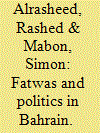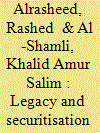| Srl | Item |
| 1 |
ID:
177692


|
|
|
|
|
| Summary/Abstract |
Religious discourse has a fundamental impact on sectarian violence, stability and sovereignty across the Gulf region. Amidst an increasingly volatile political and social situation, fatwas serve as a prominent factor in the behaviour and beliefs of individuals and groups across the Gulf. Fatwas have long been a source of great interest in religious studies and international law yet very little work has been undertaken in politics. This article aims to analyse the impact of fatwas from Shiʿi and Sunni clerics in the promotion of sectarian violence across Bahrain in the aftermath of the Arab Uprisings. In this article, it will be argued that religious discourse has a significant impact in determining the nature of the political relationship between the components of society in Bahrain. We argue that fatwas serve a key role in regulating life across the island and, in the aftermath of the 2011 uprisings, in facilitating sectarian violence.
|
|
|
|
|
|
|
|
|
|
|
|
|
|
|
|
| 2 |
ID:
193251


|
|
|
|
|
| Summary/Abstract |
After the Arab Spring took place in Syria in 2011, the relationship between the rulers and the ruled across the region became increasingly strained. In a fractious context, several opposition groups sought to overthrow the regime in Syria, as a consequence of a perceived lack of religious legitimacy. The Lebanese Hezbollah policies towards the Syrian crisis have been impacted by ideological variables, the regional balance of power, Arab community structures, and geo-strategic factors. Hassan Nasrallah, the leader of Lebanese Hezbollah has regularly delivered speeches to secure the survival of the Axis of Resistance. The main aim of this paper is to investigate the objects of threat and the legacies which were used for the securitisation in the Syrian crisis. The authors, Rashed Alrasheed and Khalid Amur Salim Al-Shamli show that legacy issues facilitate the securitisation of Israel, USA, ISIS, and Sunni groups in Syria and generate suitable circumstances to move the audience of the Axis of Resistanc.
|
|
|
|
|
|
|
|
|
|
|
|
|
|
|
|